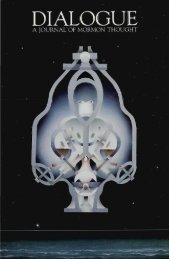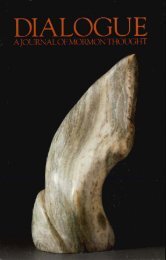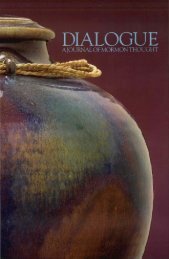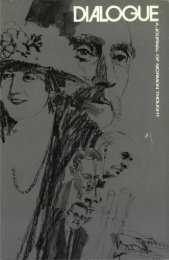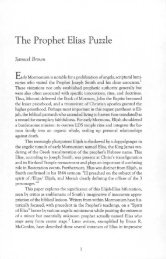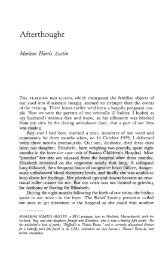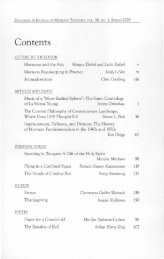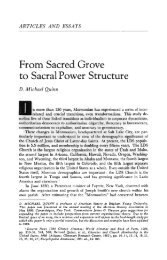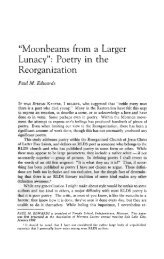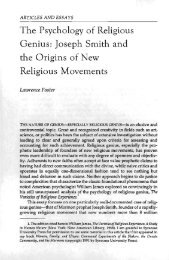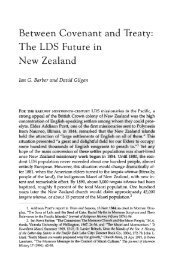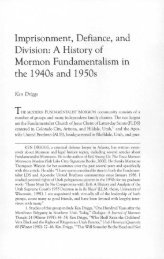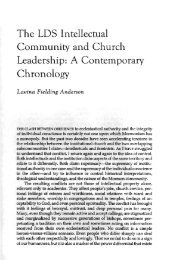Dialogue, Volume 25, Number 2 - Dialogue – A Journal of Mormon ...
Dialogue, Volume 25, Number 2 - Dialogue – A Journal of Mormon ...
Dialogue, Volume 25, Number 2 - Dialogue – A Journal of Mormon ...
Create successful ePaper yourself
Turn your PDF publications into a flip-book with our unique Google optimized e-Paper software.
Lindquist: The Bambara Mirror 63<br />
in his possession. For the real reason for the excisions, the interpreter<br />
eventually admitted, has been control.<br />
The honeymoon reinforces the Bambara girl's knowledge <strong>of</strong> her<br />
body's duties —to satisfy her husband's sexual desires, to exhibit his<br />
virility, and to begin to reproduce both the parents' labor pool and<br />
their chance for immortality (as the more <strong>of</strong>fspring that survive, the<br />
more likely the parents will be remembered through the generations).<br />
To stimulate procreation immediately, two days before the marriage<br />
ceremony the bride is given an herbal medicine that induces diarrhea<br />
to make her internally "clean" and outwardly "docile." During the<br />
honeymoon week, a first bride and groom, accompanied by their female<br />
teacher to instruct them in sexual matters, stay in a hut where others<br />
provide them food. Among the food is hot cereal for the bride to<br />
heighten "athleticism" and sour milk for the groom to increase his<br />
potency.<br />
The girl will generally have a child within the year and another<br />
each year or two until death or menopause. Her body will likely deteriorate<br />
quickly due to malnutrition, disease, exhaustion, the stress <strong>of</strong><br />
multiple births, and continuous bleeding resulting in severe anemia.<br />
The Bambara female, then, knows early, probably unconsciously, that<br />
her body is a tool to raise capital and to provide labor, status, immortality,<br />
and pleasure — perhaps for herself, but first for father, brothers,<br />
and husband.<br />
Ouelessebougou meant physical and psychic exhaustion: dancing<br />
in temperatures that reached 115 degrees, sleeping on hard ground<br />
with goats baaing and cocks crowing at first light, bouncing in the<br />
bruising back <strong>of</strong> a pick-up truck over rutted donkey paths enveloped in<br />
fine dust, communicating in languages unwieldy or totally unlearned,<br />
and feeling overwhelmed by a flood <strong>of</strong> sensory details and emotional<br />
overload. It was only after leaving Ouelessebougou that I slowly perceived<br />
how unmistakably I, a <strong>Mormon</strong> woman <strong>of</strong> dissimilar appearance<br />
and opportunity, am psychic sister to these Bambara women.<br />
In more subtle ways our bodies also become material means for<br />
illustrating a male's power, beginning with the ritual <strong>of</strong> the father's<br />
bestowing, without the mother, his own name upon his infants. A<br />
proper surname assigns place, confirms genealogical belonging. Later,<br />
we are taught as adolescent girls to heed a Young Women <strong>of</strong>ficer's<br />
warning that honorable young men do not want to eat "the doughnut<br />
with the frosting licked <strong>of</strong>f" or "the Twinkie with the filling sucked<br />
out." We could discuss the perversions beneath the <strong>Mormon</strong> surface,<br />
some <strong>of</strong> them applicable to any community, many <strong>of</strong> them inherent in<br />
a patriarchal society: the incest, wife-beating, rape, lower wages for<br />
women, the scarcity <strong>of</strong> women in management positions, white-collar



